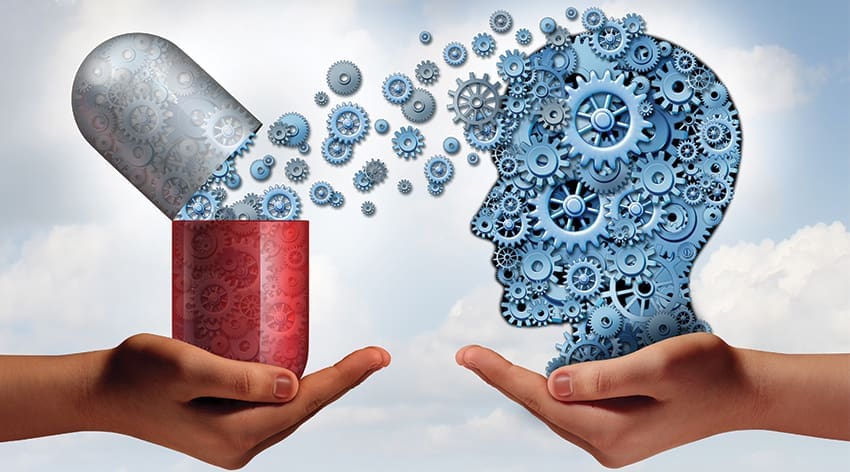-
Call Us: 0330 111 2015


Jump to a section ▼
› Introduction
› Effects on the body
› Effects on the brain
› Treatment at Delamere
Speak with our admission team
Call now on 0330 111 2015Nearly everyone at some time in life has the need to take prescription drugs. When taken as prescribed for a genuine complaint, prescription drugs can be safe and serve a genuine medicinal purpose in healing the body and the brain.
Prescription drugs only become dangerous when they are abused or mismanaged. Whether that be through staying on a prescription for too long, self medicating or using them to get high.
Prescription drug abuse and addiction carries both short term (immediate) risks and long term health risks to your physical and mental well being. Sometimes the damage caused through abuse of prescription drugs is advanced to the point it cannot be reversed or healed.
If you are abusing prescription drugs, we urge you to consider the risks prescription drug abuse poses to both your body and brain. Repeatedly abusing prescription drugs can easily lead to addiction, a life threatening condition that responds to treatment but cannot be cured.
Prescription drugs, when abused, have a variety of short term effects on the body These short term effects are very much dependent on the type of drug being abused i.e a stimulant or depressant prescription drug.
The short term effects of prescription drug abuse can immediately impact on the body’s wellbeing and ability to function.
Most short term effects are reversible through medical treatment and cessation of the drug abuse. However, some effects can be more or less instantly fatal.
Long term effects of prescription drug abuse to the body tend to occur as a result of repeatedly abusing prescription drugs. As a result, they are far more complex to treat and some physical health problems may require ongoing treatment, even on stopping the abuse of prescription drugs.
The short term effects of prescription drug abuse to the brain can vary depending on the type of drug being abused. These effects occur whilst the user is intoxicated or during the come down period from the drug. Rarely are they long lasting and tend to stop once the drug has left the individuals system.

The long term effects of prescription drug abuse to the brain can be treated and managed but not always fully reversed. Long term effects to the brain occur through prolonged and/or chronic abuse of prescribed drugs. They are more ingrained; as a result they are more complex to treat.
Repeatedly abusing prescription drugs causes a lasting impact on the brain and the way it functions. This is what leads to addiction and the maladaptive behaviours associated with the disorder.
Addictive drugs, including commonly abused prescription drugs, provide a shortcut to the brain’s pleasure/reward system. Abusing prescription drugs causes the brain to be flooded with excessive amounts of dopamine, resulting in a euphoric high.
Abusing prescription drugs is no different to abusing alcohol, illicit drug, food or sex. Anything that is done to excess or artificially produces excessive amounts of dopamine can result in addiction.
Dopamine is what drives us to engage in healthy activities. Our brains are pre programmed to engage in pleasure rewarding activities that keep us healthy, reproducing and alive.
Rewarding activities include eating, exercise, love, sex, hobbies and time spent with family and friends. All of these things produce dopamine, we enjoy them, they are good for us in moderation and we feel good as a result.
When the brain is introduced to excessive amounts of dopamine that are artificially initiated through the abuse of prescription drugs, it lays down a new memory associating the instant feel good factor with the drug as the stimulus.
Repeatedly abusing drugs causes the brain to structurally change its reward system and pathways. Overtime (sometimes a very short time) the brain starts to reprioritise its rewarding stimuli, with the stimuli that produces the most dopamine taking over everything else 7.8

Source: National Institute on Drug Abuse. The brains neurotransmitters and pathways are altered through repeated drug abuse, leading to the development of addiction
Once addicted to prescription drug abuse, the brain no longer responds to old healthier methods of reward. This is why addicts seemingly choose drugs over their careers, activities they used to enjoy, loved ones and even their own children.
The truth is they are not choosing anything, their brain has reprioritised its needs and compels the user to get high regardless of consequences to physical, mental, emotional, social and financial health 7,8
 Detox safely in our medical facility
Detox safely in our medical facility
 Free collection
Free collection Future-proof
Future-proof
We at Delamere understand that addiction affects each person differently. As addiction is caused by structural changes and damage caused to the brain, it sadly cannot be cured. It can however, be successfully arrested, treated and recovery can be maintained.
Our team of multidisciplinary medical and addiction treatment experts use evidence based treatments to essentially help re-programme our patients brains. This encourages them to engage in healthier rewarding behaviours. Quite often, as a result of our innovative treatments, patients are able to become the best version of themselves.
Our prescription drug addiction treatment involves many evidenced behavioural therapies. We also address trauma, mental health illnesses and potential triggers for relapse.
At Delamere we teach our patients new coping strategies and ways of managing their thoughts, emotions and responses. With time, continued abstinence, support and application, our patients are able to adopt healthier behaviours in favour of their old self destructive ways. This is how the miracle of recovery happens.
References
Start your recovery journey by calling our admissions team today.
Confidential. Straightforward. Friendly.